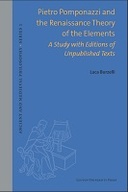Explore

Pietro Pomponazzi and the Renaissance Theory of the Elements
LUCA BURZELLI
2024
0 Ungluers have
Faved this Work
Login to Fave
First ever editions of texts on the elements from Pomponazzi’s lectures on De coelo, De sensu, Meteorologica and De generatione et corruptione.
In medieval and early modern natural philosophy, very few issues were as controversial as the nature of the elements. From the thirteenth up until the sixteenth century, European thinkers discussed this problem with growing interest. Defining the nature of the elements was key to deciphering the very structure of the universe and the essence of things. Along with five primary texts, here edited for the first time, this book discusses one of the most original contributions to this debate, that of Renaissance philosopher Pietro Pomponazzi (d. 1525). Pomponazzi’s account, developed in university lectures, holds significance for two reasons. First, it provides a thorough description of the most influential doctrines on the elements presented by medieval scholars, opening a window onto three hundred years of prior discussions on the topic. Second, Pomponazzi also develops his own views on the issue, explicitly defining them as ‘heretical’ to emphasise his departure from all opinions expressed before him.
Ebook available in Open Access. This publication is GPRC-labeled (Guaranteed Peer-Reviewed Content).
This book is included in DOAB.
Why read this book? Have your say.
You must be logged in to comment.
Rights Information
Are you the author or publisher of this work? If so, you can claim it as yours by registering as an Unglue.it rights holder.Downloads
This work has been downloaded 45 times via unglue.it ebook links.
- 45 - pdf (CC BY-NC-ND) at Unglue.it.
Keywords
- Aristotelianism
- Elements
- hylomorphism
- Latin Averroism
- Matter
- Pietro Pomponazzi
- Primary qualities
- Renaissance Universities
- Substantial forms
- thema EDItEUR::Q Philosophy and Religion::QD Philosophy::QDH Philosophical traditions and schools of thought::QDHF Medieval Western philosophy
Links
DOI: 10.11116/9789461665607Editions

